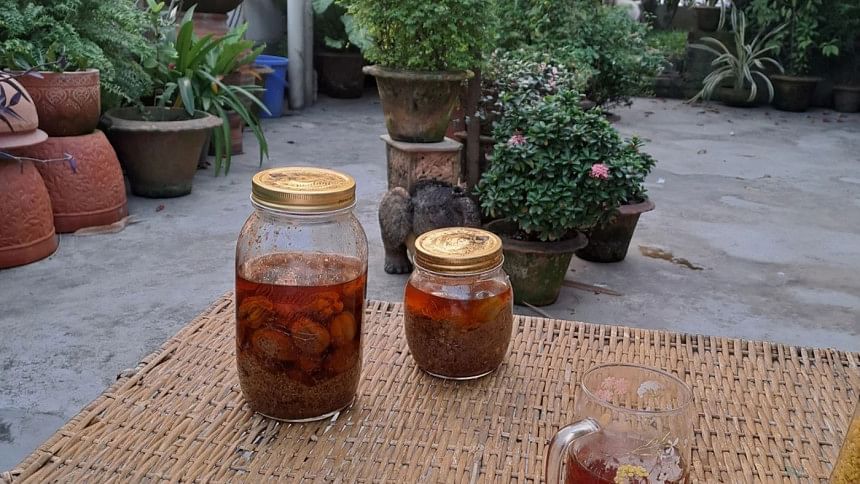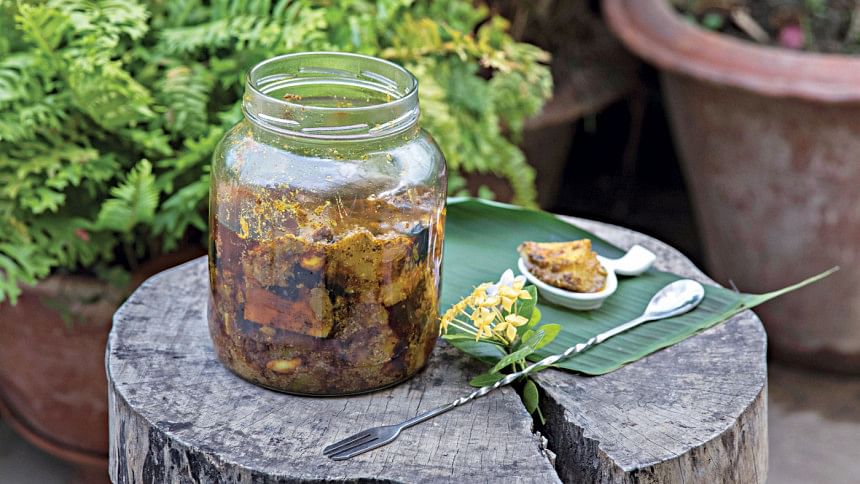Pickles, memories and November’s magic

November in the tropics has its own weather mix. From a storm brewing at the Bay to roaring gusty wind, to a scorching sunny day, dewy evening, and foggy dawn -- Dhaka's weather in this month cannot be explained.
At times, it is almost like you have to turn on the air conditioner, but also need a heavy blanket to balance things out – a puzzle of sorts to put it simply!
Whichever way you want to see it, November afternoons are a mix of nostalgia and romance. For me, they spin a dreamy, almost forgotten spell.
It is the time for jolpai or our "deshi" olives. Our variety is different from the Mediterranean ones, it has a hard-big stone with a thin sour layer of flesh and makes for the best kind of tropical pickles.
I have the fondest memories of those delights dunked in mustard oil. When my grandmother would prepare for her afternoon nap, I remember my cousins and I would tiptoe to her adjoining open terrace and sample her pickles, which were laid down to dry in the sun.
She would meticulously wash the olives, pat them dry with a thin mulmul cloth, lovingly smear mustard and chilli paste, and place them on beautifully printed tin platters, "ccheni" as it is colloquially called. Her big platters would be covered with lace or crochet wraps and would have at least two to three kilogrammes of such spicy delights.

Simultaneously, she would fill her big stone jars with mustard oil and also heat them under the sun. The idea of her unique recipes was that both the oil and the olives be cooked by harsh sunrays for several days before dunking them in the oil. The November sun would make the oil bubble up from the heat and the enticing aroma of the pickle would leave us drooling.
Grandma was superstitious about her pickles getting the fungus and would have a black scarecrow to ward off birds, crows, and evil eyes, but poor Nonna had no idea how to shoo us pests off.
She sired 18 children and would fill up 18 jars and send them as season's favours. The rest, she would keep for herself, only to serve to us grandkids when we were invited to a lunch of khichuri, begun bhaji, and beef at her old two-storied house in Purana Paltan.
My Nonna would also have salted beef shutki or sun-dried salted beef hung on her open terrace. Her roses, her white crisp starched sari swaying in the air and the aroma of her pickles as she put oil in our hair are stories full of love and lost dreams. Seasons, flowers, recipes, events, culture, memories -- each of these intangible moments make up our tales in this old city of ours.
The reason for me to talk about this long-forgotten ritual is that I was trying to replicate her recipe and coincidentally my cousin sent me a jar of achar. These customs and gestures attuned to the season were part of the sixties, seventies, and even eighties in Dhaka. We had mango, tomato, elephant's apple, hog plum, and all sorts of pickles and chutneys in the sun to do its magic with vitamin D.
Today's cosmopolitan Dhaka is spinning different stories for our children and they will fondly remember the city with their memories. However, I am not sure whether we would make half such memories for our children or grandchildren. All we can do is try grabbing those plump green olives today from the local bazaars and try to recreate that magic.

 For all latest news, follow The Daily Star's Google News channel.
For all latest news, follow The Daily Star's Google News channel. 



Comments